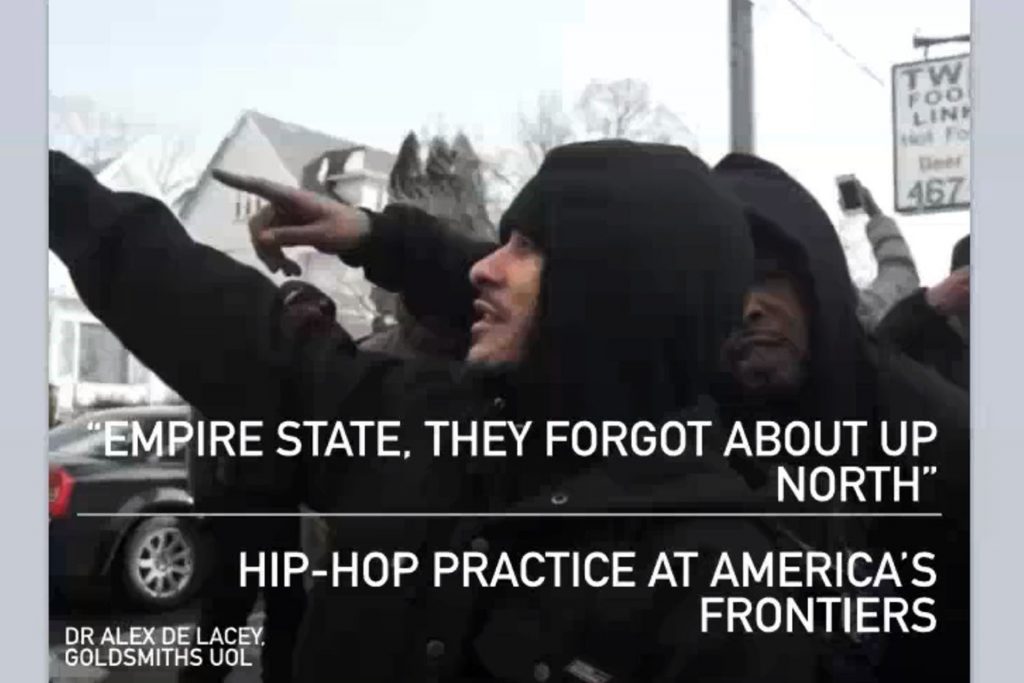The fourth Americanist Symposium, organised by Jack Dice and Irene Lopez, postgraduate students at The Centre for American Studies at the University of Kent took place on 21st November. Sponsored by the School of English, School of History, and BAAS, this year’s theme was ‘The Spatial Americas.’ The myriad of topics explored by the speakers in the four panels (with four speakers per panel), as well as the concluding keynote lecture delivered by Dr. Anne-Marie Angelo, shaped an original, connective, and interdisciplinary event which subverted the common use of space as ‘a context’ by bringing it to the forefront of the conversation to interrogate how the Americas are spatially constructed. In spite of COVID-19, and adapting the event to an online format, it was a fantastic day with so many inspiring papers, ideas, and discussions coming from all directions.
In the first panel, Liminalities and Frontiers, the speakers explored those liminal spaces from a wide range of perspectives:
- Dr. Alex de Lacey (University of London) “Empire State, they forgot about up North”: Hip-hop practice at America’s frontiers and his focus on Afrodiasporic music practice
- Maximilien Zahnd (University of Cambridge) Of Tax Law and Space: The Implementation of the 1919 Alaska School Tax on the socio-cultural, spatial, and political impact tax law had on Alaska Natives.
- Lucy Mounfield (University of Nottingham) Whose America is it Anyway? Place, Periphery and Photography addressing key problems in the historiography of American amateur photography
- Connie Thomas (University of London) Disparity in Uniformity: Regional Migration Politics and the US Constitution exploring the regional variations that framed migration policy during the founding era.
The speakers in the second panel, Written Spaces: The Geographies of American Literature, focused on the relation between literature and its multiplicity of spaces, by taking a critical look at their own academic research. It opened with:
- Laurie Mcrae Andrew, Royal (University of London) Geography, race, and the contemporary novel: Colson Whitehead’s Apex Hides the Hurt connecting the geography of 21st century America, the practice of the novel, and the politics of racial power and resistance.
- Sam McNeilly (University of Surrey) Oil, Space, and Deracinated Populations: The Centripetal and Centrifugal Forces of American Petroecologies examined the relationship between America’s transition to fossil fuels and literary naturalism.
- Jun Qiang (University of York) Seeing the American Woman and Space: New Woman and New York Hotel in Edith Wharton’s The Custom of the Country focused on the relation between women and their places of residence in New York.
- Patrick Turner (King’s College London) Settler Gardens in Nineteenth Century U.S. and Argentinean Literature presented the use of botanical imagery in literary naturalism in the United States and Argentina.
After the morning panels, the afternoon panels were as exciting as the previous ones. Speakers in the third panel, Space, Memory, and Exile were:
- Hattie Hearn (University of East Anglia) ‘We have come home’: The significance of WWII US 8th Air Force bases in England as sites for repatriation, which examined the material legacy of the US 8th Air Force’s time in England during the Second World War.
- Conall Treen (University of St Andrews) Exile in the Wilderness: An Examination of American Loyalist Perceptions of New Brunswick Landscapes during Post-War Resettlement, 1783-1790 explored the Loyalist resettlement of what would become the colony of New Brunswick during the late eighteenth century.
- Samuel Moriarty (Queen’s College, Oxford) ‘Detached bones…intricacy of heaps’: the traces of pain and Melville’s taphonomic ecologies of remembrance we dived into Melville’s ecologies of pain.
- Anne Stokes (University of Manchester) Making Space for a King: American Memorials to Martin Luther King Jr. brought us to the memorialization of the American civil rights and black power movements.
The last panel, Racialised Spaces, included the following speakers:
- Dr. Anna Diamantouli (The American College of Greece) ‘I cannot give so particular a description of this city as I could wish or my readers may desire’: Negotiating the Space of the ‘Barbary States’ in American Barbary Captivity Narratives exploring the diverse modes of negotiating space found within the range of American Barbary captivity narratives published in the new national period.
- Olivia J Arigho-Stiles (University of Essex) Elite constructions of race and space in pre-revolutionary Bolivia (1910-1952) argued that geography was central to the construction of a racialized modernity in pre-revolutionary Bolivia.
- Andrew Novell (University of East Anglia) From Empty Space to Sacred Place: The Decolonising Role of ‘Place’ in Native American Site-Specific Theatre focused on the function of ‘place’ within site-specific Native American theatre.
- Siân Round (University of Cambridge) Locating and Disturbing the Post-Plantation South: Julia Peterkin’s Dialect Stories in The Reviewer examined how the spaces and definitions of the South in the 1920s were created through a self-conscious writing outward and an awareness of reception and tradition.
To conclude the symposium, we experienced an amazing keynote lecture delivered by Dr. Anne-Marie Angelo (University of Sussex) presenting her forthcoming book Black Power on the Move: Migration, Internationalism, and the British and Israeli Black Panthers. In her lecture, she brilliantly examined the Black Panther movements of Israel and the United Kingdom in order to understand how Black Power was transformed from an African-American movement to a global black freedom struggle.
This was a fascinating and interdisciplinary symposium that confirmed the pluralism of American Studies as a field of research and demonstrated the supportive framework that postgraduate-led initiatives might offer.

